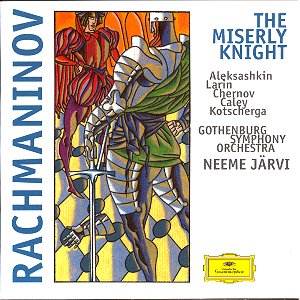 |
Sergei RACHMANINOV Crotchet
AmazonUK
AmazonUS |
Rachmaninov is not exactly known for being a composer of operas, though his graduation exercise was just one such an example (Aleko), and brought him to the attention of the public when he was twenty years old. He wrote three one-act operas, Aleko in 1893, The Miserly Knight and Francesca da Rimini in the years 1903-05 with both the latter forming a double-bill première at Moscow’s Bolshoi Theatre on 24 January 1906, and six years later in St Petersburg. Incidentally this same pairing will be given concert performances by Chelsea Opera Group under David Lloyd-Jones at London’s Queen Elizabeth Hall on 16 March 2002. All have gloomy plots, unsurprising considering the compulsive fatalism of their composer. Between the first two operas Rachmaninov’s career went into a nosedive after the flop of his first symphony followed by his nervous breakdown and withdrawal from life as a composer. He spent the wilderness years as an opera conductor in Moscow, often working closely with the young Chaliapin and gradually his self-esteem was restored so that by the turn of the twentieth century he had recovered enough to produce the second piano concerto.
Back in 1830 Pushkin was the author of a quartet of little tragedies, one of which was The Miserly Knight (Darghomizhsky, Rimsky-Korsakov, and Cui had already set the others), and like most composers of the period, any visit to Bayreuth to hear Wagner’s operas made an enormous impression upon Rachmaninov. The orchestral writing and use of leitmotivs in The Miserly Knight were the obvious result, the story itself has reminiscences of the Ring in the Knight’s miserly lust for gold, and there’s duels, denouncements and death aplenty in its three scenes. The five-member cast is totally male, plenty of dark colours from bass-baritone Aleksashkin in the title role and ably supported by the tenor Larin as his son Albert. The ubiquitous Neeme Järvi (since overworked to the detriment of his health) conducts with a masterly feel for the idiom.
Christopher Fifield